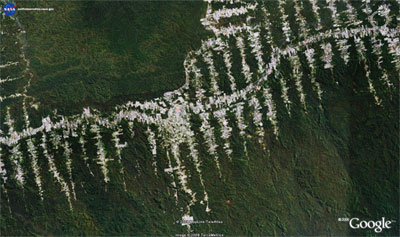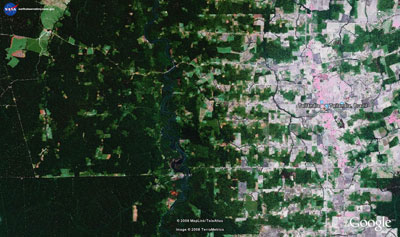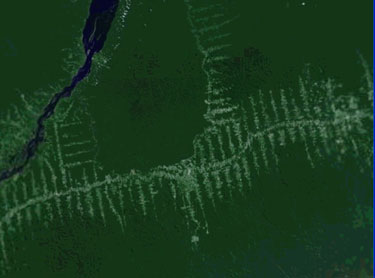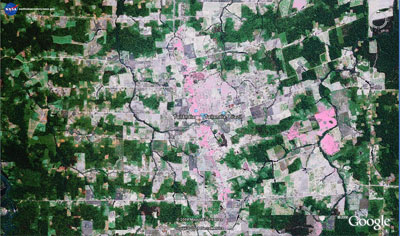Chainsaws, bulldozers, and fires are tools of rainforest destruction, but roads are enablers.
Roads link markets to resources, enabling loggers, farmers, ranchers, miners, and land speculators to convert remote forests into economic opportunities. But the ecological cost is high: 95 percent of deforestation in the Brazilian Amazon occurs within 50-kilometers of a road, while in Central Africa, where logging roads are rapidly expanding across the Congo basin, the bulk of bushmeat hunting occurs near roads. In Laos and Sumatra, roads are opening last remnants of intact forests to logging, poaching, and plantation development. But roads also cause subtler impacts, fragmenting habitats, altering microclimates, creating highways for invasive species, blocking movement of wildlife, and claiming animals as roadkill. A new paper, published in Trends in Evolution and Ecology, reviews these and other impacts of roads on rainforests. Its conclusions don’t bode well for the future of forests.
 BR-230 highway near Rurópolis, Brazil in the heart of the Amazon. Image courtesy of Google Earth |
Examining a large body of scientific literature, William F. Laurance, Miriam Goosem and Susan G.W. Laurance write that roads “can have an array of deleterious effects on tropical forests and their wildlife” in the form of biological and socioeconomic impacts. The latter is a far greater threat to forests.
Over the past half century road networks have expanded across the tropics, opening remote forests to development. Once prompted primarily by political objectives such as national security, alleviating population pressures in cities, and rural development, roads are increasingly built by private interests — loggers, miners, and agribusiness — seeking access to resources and land. These “unofficial” roads complement existing government-sanctioned roads, amplifying their already substantial impact. Industry also exerts pressure on lawmakers to fund road improvement projects, like the paving of highways. These improvements further promote the expansion of unofficial road networks, which improve the economic viability of resource extraction and agricultural production in once inaccessible areas, attracting colonists and speculators, who cut and burn forests, hunt, and introduce alien species. Improved economic viability provides greater incentive for more road-building and the cycle continues.
Roads in the Amazon
The Brazilian Amazon is prime example of how roads have spurred large-scale change in the rainforest. Extensive deforestation began in the late 1960s when the Brazil’s military government launched development programs to promote colonization in the region. The plan, which sought to provide economic opportunities for landless poor from crowded parts of the country and establish a national presence in the vast and sparsely populate interior, offered subsidized loans to settlers and ranchers, and funded ambitious highway projects like the Trans-Amazonian highway.

|
While the Trans-Amazonian largely failed to meet its economic and social goals, it did open up large tracts of previously inaccessible rainforest land to development. Vast stretches of land were cleared for low-intensity cattle pasture and short-term subsistence agriculture. Despite laws restricting land-clearing to 50 percent of a settler’s holdings, deforestation rates climbed from negligible to more than 20,000 square kilometers per year in the 1980s. Giant infrastructure projects—notably dams—facilitated development in the region, while logging spurred the growth of unofficial road networks and subsidized agricultural expansion that has helped turn Brazil into the world’s largest exporter of many farm products. Its emergence as a global agricultural superpower has today created in Brazil a strong political block that lobbies for new infrastructure developments in the Amazon. With tens of billions of dollars now allocated to projects, including improvement of existing roads and construction of new highways, the future of the Amazon is increasingly linked to globalized markets, including demand for commodities.
But road impacts in the Amazon are not limited to Brazil. Peru is putting the finishing touches on the Carretera Transoceanica, a highway that will connect the heart of the Amazon to Pacific ports. The project, which is largely funded by China and Brazil, will create an export pipeline for timber, minerals, and agricultural products to the world’s fasting-growing consumer. Oil, gas, and mining companies are already setting up shop in the area, sometimes in conflict with indigenous groups and protected areas. Meanwhile roads are also extending into key forest areas in Guyana, Colombia, Ecuador, Venezuela, and other parts of Peru.
Outside of Latin America, major roads projects are planned or under construction in a number of tropical forests areas. Among others, the authors note the Trans-Congo Road in Democratic Republic of Congo, a 1600-km road that will cut southeast to northwest across the Congo Basin providing access to timber and minerals; the North–South Economic Corridor, a 1500-km highway across Laos, Cambodia, Thailand and Myanmar; the Leuser Road Plan, a network of more than 1600 km of major and minor roads in northern Sumatra; and the Mamberamo Basin Road which will run 1400 km through primary rainforests in northwestern New Guinea (Indonesia).
Limiting damage from roads
Aside from restricting development of new roads from frontier forest areas, there are limited options for mitigating the impacts of road expansion. Current efforts focus on measures taken in advance of road construction. For example, the Juma Sustainable Development Reserve Project for Reducing Greenhouse Gas Emissions from Deforestation aims to curb forest clearing along the AM-174 and BR-319 highways by establishing a network of strict protected areas along the roads. The project is financed by a forest carbon fund on the basis that it will reduce emissions from deforestation by 190 million tons of carbon dioxide by 2050 compared to a business-as-usual approach.
 Roads in the Brazilian Amazon. Courtesy of Digital Earth. |
The authors also highlight other mechanisms for minimizing road impacts, including regulating access to roads, promoting railroads when possible, requiring proper environmental impact assessments prior to construction, limiting road width and gradient, restricting tree clearing along roads, and banning night-time driving. But in the end, the authors conclude that “actively limiting frontier roads… is by far the most realistic, cost-effective approach to promote the conservation of tropical nature and its crucial ecosystem services.”
William F. Laurance, Miriam Goosem and Susan G.W. Laurance. Impacts of roads and linear clearings on tropical forests. Trends in Evolution and Ecology (TREE) 1149 1–11
Related articles
Oil road transforms indigenous nomadic hunters into commercial poachers in the Ecuadorian Amazon

(09/13/2009) The documentary Crude opened this weekend in New York, while the film shows the direct impact of the oil industry on indigenous groups a new study proves that the presence of oil companies can have subtler, but still major impacts, on indigenous groups and the ecosystems in which they live. In Ecuador’s Yasuni National Park—comprising 982,000 hectares of what the researchers call “one of the most species diverse forests in the world”—the presence of an oil company has disrupted the lives of the Waorani and the Kichwa peoples, and the rich abundance of wildlife living within the forest.
New legislation in Brazil opens up road-paving across country, threatening Amazon
(04/21/2009) Brazil’s Chamber of Deputies has approved a measure that would speed up paving roads across the country, including paving a road that environmentalists have long-fought, BR-319. Environmental groups across the nation have warned of widespread deforestation if the measure passes the Senate and is signed by the president.
Reserves with roads still vital for reducing fires in Brazilian Amazon
(04/08/2009) Analyzing ten years of data from on fires in the Brazilian Amazon, researchers found that roads built through reserves do not largely hamper a reserve’s important role in reducing the spread of forest fires. The finding is important as Brazil continues a spree of road-building while at the same time paving over existing roads.
Brazil to boost spending on infrastructure to counter economic crisis
(02/05/2009) Brazil will increase spending on infrastructure projects by 28 percent to in response to the global financial crisis, reports Bloomberg.
Forest elephants learn to avoid roads, behavior may lead to population decline
(10/27/2008) Forest elephants in the Congo Basin have developed a new behavior: they are avoiding roads at all costs. A study published in PLoS One concludes that the behavior, which includes an unwillingness to cross roads, is further endangering the rare animals which are already threatened by poaching, development, and habitat loss. By avoiding roads, the elephants are increasingly confining themselves to smaller areas lacking enough habitat and resources.
Borneo logging road puts rainforest, indigenous communities at risk
(10/22/2008) A 186-mile (300-km) logging road to the top of the Bario highlands in northern Sarawak puts the state’s increasingly rare natural forest at risk, warns the Borneo Resources Institute, a grassroots environmental group.
Brazil suspends Amazon road project until protected areas established
(09/26/2008) Brazil has temporarily suspended the paving of a major Amazon road pending demarcation of 13 neighboring protected areas, reports the Associated Press.
Roads are a major killer of amphibians, reveals study
(05/29/2008) Frogs, toads, and salamanders worldwide are dying from mysterious causes, with possible culprits ranging from habitat loss to fungal diseases. Now, researchers at Purdue University believe they may have identified a significant and surprising contributor to global amphibian declines: traffic. In a recent study, the scientists looked at road kill along several stretches of road in northwestern Indiana and found that 93 percent of the dead animals were amphibians.
Peru fails to investigate murder of Amazon environmental leader
(04/22/2008) Peruvian authorities failed to respond to requests for protection from Julio Garcia Agapito, the environmental leader who was gunned down in southeastern Peru in late February, according to a new petition which calls for an investigation into his murder. Julio Garcia’s killing at the hands of an illegal logger set off international outcry and highlighted rising tensions over the paving of a highway in the Amazon rainforest.
Asia Pulp & Paper destroying rare Sumatra forest
(03/27/2008) Companies linked to timber giant Asia Pulp & Paper (APP) are illegally building a road that runs through highly endangered peatland forest on the island of Sumatra, according to an investigative report published by Eyes on the Forest, a coalition of NGOs in Indonesia. The road would allow APP and its affiliates to log forests for timber and drain peat soil for the establishment of oil palm plantations. The action would release large amounts of carbon dioxide into the atmosphere from one of the world’s largest contiguous tropical peat swamp forests.
Railroad could reduce Amazon deforestation relative to proposed highway
(03/24/2008) Building a railroad instead of improving a major highway could reduce deforestation and biodiversity loss in the heart of the Amazon rainforest says an Brazilian environmental group.
Amazon environmentalist gunned down in Peru
(03/14/2008) After reporting a truck loaded with mahogany illegally logged from the Amazon rainforest, Don Julio Garcia Agapito, a Peruvian environmentalist was gunned down by unknown assailants on February 26th, 2008. He is survived by his family.
Industry-driven road-building to fuel Amazon deforestation
(03/12/2008) Unofficial road-building will be a major driver of deforestation and land-use change in the Amazon rainforest, according to an analysis published in Philosophical Transactions of the Royal Society B. Improved governance, as exemplified by the innovative MAP Initiative in the southwestern Amazon, could help reduce the future impact of roads, without diminishing economic prospects in the region.
Toll road could raise money for Amazon conservation
(07/15/2007) Southeastern Peru is arguably the most biodiverse place on the planet. A new highway project, already under construction, poses a great threat to this biological richness as well as indigenous groups that live in the region. While its too late to stop the road, called the Carretera Transoceanica or Interoceanic Highway, there are ways to reduce its impact on the forest ecosystem and its inhabitants.
Logging roads rapidly expanding in Congo rainforest
(06/07/2007) Logging roads are rapidly expanding in the Congo rainforest, report researchers who have constructed the first satellite-based maps of road construction in Central Africa. The authors say the work will help conservation agencies, governments, and scientists better understand how the expansion of logging is impacting the forest, its inhabitants, and global climate.
Logging roads lead to disease, social breakdown in Ecuador rainforest communities
(12/04/2006) Logging roads are linked to increased incidence of diarrheal disease and new social problems among communities along the Ecuadorian coast, according to a new study published in the Online Early Edition of Proceedings of the National Academy of Sciences (PNAS) for the week of December 4-8, 2006. Lead by Joseph Eisenberg, assistant professor of epidemiology at the University of Michigan School of Public Health, an international team of researchers examined diarrheal infections and social networks in 21 villages recently connected to a new government-constructed road network in the Choco rainforest of coastal Ecuador. They found that the new roads bring colonists to the region and allow villagers to travel more easily between villages and larger cities. Increased mobility increases the spread of bacteria, viruses and parasites according to Eisenberg.
Roads tied to bushmeat hunting in Africa
(05/09/2006) A new study ties the presence of roads to bushmeat hunting in the Congo rainforest and also raises important questions on global conservation approaches. The study, published in the current edition of conservation Biology, found roads and associated hunting pressure reduced the abundance of a number of mammal species including duikers, forest elephants, buffalo, red river hogs, lowland gorillas and carnivores. The research suggests that even moderate hunting pressure can significantly affect the structure of mammal communities in central Africa. The researchers, lead by William F. Laurance of the Smithsonian Tropical Research Institute, raise an interesting point with considerably wider implications for global conservation efforts, arguing that “as a multinational conglomerate, Shell-Gabon?s interests in environmental management at Rabi… largely reflect their sensitivity to international opinion and pressures from consumers.” Drawing on their personal experiences in Africa and Latin America, the team writes “smaller corporations based in developing nations are sometimes less interested and often less capable of financially investing in environmental protection.” This observation leads the researchers to ask, “As conservationists, do we pressure large, multinational corporations based in industrial nations to forego major projects in developing countries in an effort to limit environmental degradation, or do we favor such firms over smaller, national companies in the hope that they will be more sensitive to international pressures?” While their question us especially pertinent to Central Africa, it really applies to conservation on a worldwide scale. Multinational corporations can be particularly sensitive to criticism on their environmental policy and, as a result, can actually serve as competent stewards of the environment is some cases. Thus pressure exerted by green groups on large corporations may be an effective means for achieving conservation goals.
